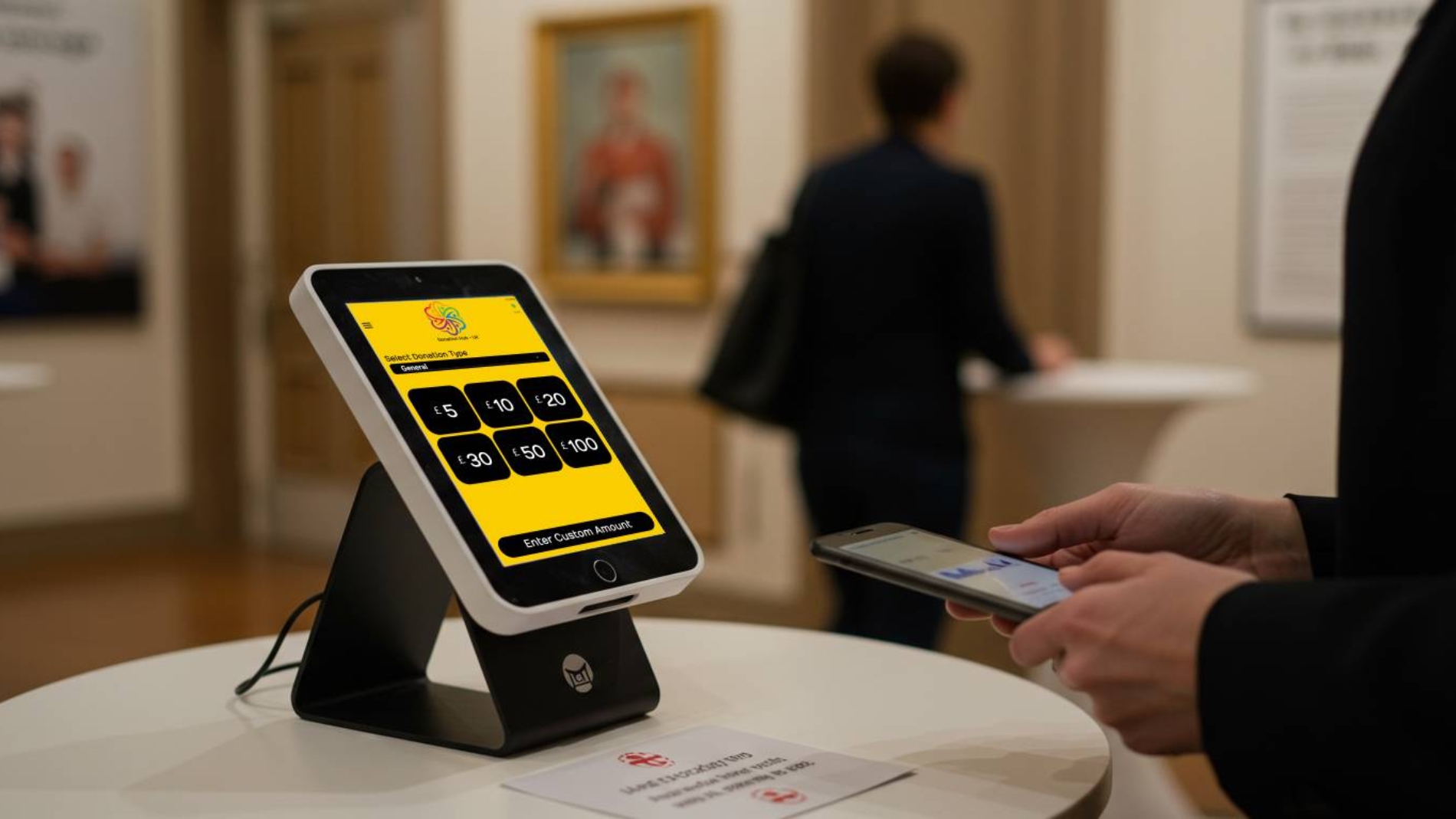As the UK moves further into a cashless society, traditional donation methods are rapidly giving way to smarter, faster, and more secure technologies. In 2025, tap-to-donate solutions are at the forefront of charitable innovation. Whether through a donation tablet, tap to donate machine, donation kiosk, or a tap to donate app, this new wave of giving is reshaping how donors engage with charities.
This comprehensive guide explores everything UK charities need to know about Tap to Donate UK, analyzing the benefits, tradeoffs, and challenges of adopting these powerful tools.
The Rise of Tap to Donate Technology
Why the UK is Going Cashless
The UK has experienced a steep decline in cash usage in recent years. According to UK Finance, only 14% of transactions were made using cash in 2024. This trend has created both a challenge and an opportunity for charitable organizations to modernize their fundraising strategies.
Tap to donate UK tools meet donors where they are—on the move, cashless, and expecting convenience. These solutions use contactless card payments or digital wallets to facilitate real-time giving.
Key Tap to Donate Tools in 2025
1. Tap to Donate Machine
A tap to donate machine is a standalone device typically used in high-footfall areas like shopping centres or events. These machines are designed for simplicity, requiring just a tap of a contactless card or mobile wallet.
Benefits:
Easy to use for donors of all ages
Visible and accessible in public spaces
Secure payment processing
Challenges:
Requires reliable Wi-Fi or mobile data
May need regular maintenance
2. Donation Tablet
A donation tablet, like the one offered by Donation Hub, is a touchscreen device that combines payment functionality with storytelling and branding. It’s perfect for locations where donor interaction matters—such as museums, religious institutions, and charity shops.
Features:
Custom donation amounts and messages
Gift Aid integration
Visual storytelling with video and image content
Tip: The Donation Hub tablet enables tap-to-pay functionality, making it a one-stop donation terminal with branding, analytics, and real-time reporting.
3. Donation Kiosk
A donation kiosk is essentially a donation tablet or terminal housed in a branded stand. These are often found in malls, airports, or hospitals.
Advantages:
Eye-catching design draws attention
Always-on availability
Supports large campaigns or permanent installations
Tradeoff: Higher upfront cost due to hardware and setup
4. Tap to Donate App
A tap to donate app enables donations through mobile phones. Users can tap their phone to a reader or scan a QR code that links to a donation page.
Best For:
Tech-savvy users
Remote campaigns or on-the-go events
Drawback: Requires smartphone familiarity and app installation
Why Charities Must Adapt in 2025
Changing Donor Expectations
Today’s donors demand ease, transparency, and speed. They expect digital receipts, Gift Aid options, and the ability to donate without digging for cash. Tap-to-donate meets these expectations perfectly.
Data-Driven Decisions
Tap-enabled devices provide real-time insights into donor behaviour, allowing charities to refine their campaigns. Platforms like Donation Hub centralize this data, offering analytics on donation times, frequencies, and value.
Versatility Across Events
From Eid collections in mosques to pop-up campaigns in parks, tap-to-donate technology fits seamlessly into any charity’s outreach strategy.
How Donation Hub Supports Tap-to-Pay
Donation Hub is a powerful platform that integrates with donation tablets, kiosks, and machines. It offers:
Custom branding: Match the device to your campaign
Tap-to-donate support: Fully contactless payment experience
Real-time analytics: Track donations as they come in
Gift Aid automation: Maximize donation value
Mobile app capability: Use the platform on any tablet or phone
Whether you’re a large nonprofit or a local charity, Donation Hub offers scalable solutions tailored to your fundraising needs.
Tradeoffs and Considerations
Technology vs. Accessibility
While tap-to-donate machines simplify giving, not all demographics are equally comfortable with digital interfaces. Providing user support or combining traditional methods with digital tools can help.
Cost vs. Long-Term Benefit
Initial costs for kiosks or tablets can be high. However, they often pay off quickly through increased donations and lower admin overhead (e.g., no cash handling).
Online Security
Security is essential. Always ensure your tap-to-donate solution is PCI-DSS compliant and uses encrypted payment processing.
Case Studies: Where Tap to Donate Shines
1. Community Events
At local festivals or religious events, tap-to-donate tablets are perfect. They’re portable, brandable, and can collect donations in seconds.
2. Shopping Centres
Donation kiosks placed near entrances or exits tap into impulse generosity. Their large screens and bright designs attract attention.
3. Museums and Galleries
Interactive donation tablets with stories or videos near exhibits invite visitors to connect emotionally—and donate instantly.
4. Places of Worship
Mosques, churches, and temples benefit from always-available donation terminals that support recurring giving.
5. Charity Shops
At the checkout counter, donation tablets encourage micro-giving, like rounding up a purchase to the nearest pound.
Final Thoughts: Embrace the Future of Giving
In 2025, contactless giving is not just a convenience—it’s an expectation. Tap-to-donate solutions are empowering UK charities to reach more donors, raise more funds, and operate more efficiently.
Donation Hub’s tablet with tap-to-pay capability is the ideal solution for charities seeking an all-in-one tool for modern fundraising. Whether you’re just starting or scaling up, it’s time to tap into the future of giving.

